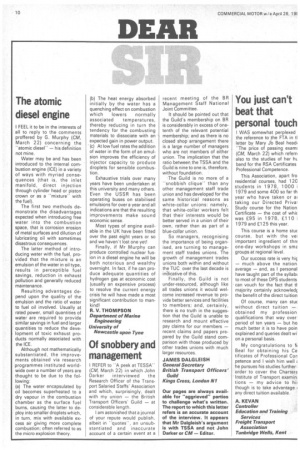The atomic diesel engine
Page 12

If you've noticed an error in this article please click here to report it so we can fix it.
I FEEL it to be in the interests of all to reply to the comments proffered by G. Murphy (CM, March 22) concerning the ''atomic diesel" — his definition not mine.
Water may be and has been introduced to the internal combustion engine (ICE) in a variety of ways with myriad consequences (that is, the inlet manifold, direct injection through cylinder head or piston crown or as a "mixture" with the fuel).
The first two methods demonstrate the disadvantages expected when introducing free water into the combustion space, that is corrosion erosion of metal surfaces and dilution of lubricating oil with sometimes disastrous consequences.
The latter method of introducing water with the fuel, provided that the mixture is an emulsion of the water in oil type, results in perceptible fuel savings, reduction in exhaust pollution and generally reduced maintenance.
Resulting advantages depend upon the quality of the emulsion and the ratio of water to fuel oil involved. Usually at rated power, small quantities of water are required to provide similar savings in fuel and larger quantities to reduce the development of toxic exhaust products normally associated with the ICE.
Although not mathematically substantiated, the improvements obtained via research programmes instituted worldwide over a number of years are thought to be due to the following: (a) The water encapsulated by oil becomes superheated to a dry vapour in the combustion chamber as the surface fuel burns, causing the latter to deploy into smaller droplets which, in turn, mix with available excess air giving more complete combustion; often referred to as the micro explosion theory.




























































































